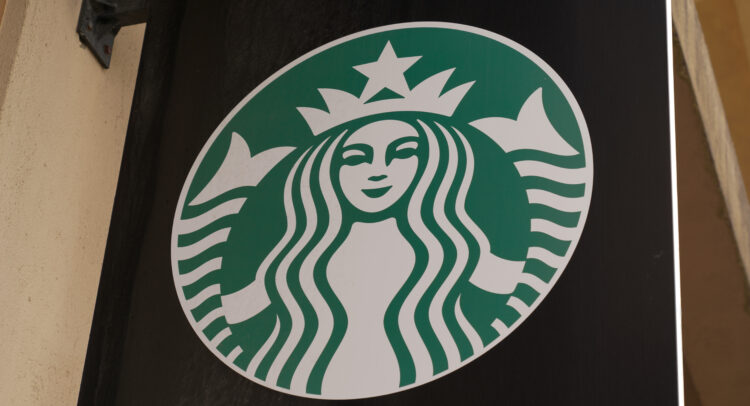Starbucks (NASDAQ: SBUX) stock appears to be trading with a premium price tag attached, despite the ongoing macroeconomic headwinds. The iconic, Seattle-based coffee company continues to thrive and shows promising earnings growth. However, upon closer examination, it becomes evident that the stock’s valuation may, at best, adequately reflect Starbucks’ growth potential and, at worst, significantly overestimate the company’s value.
Elevate Your Investing Strategy:
- Take advantage of TipRanks Premium at 50% off! Unlock powerful investing tools, advanced data, and expert analyst insights to help you invest with confidence.
Additionally, the rate of dividend growth has been gradually decelerating, and the current yield of 2.0% fails to pique my interest due to its lack of a satisfactory margin of safety. Consequently, I maintain a neutral stance on the stock.
Earnings Growth Picking Up, but Does It Justify Starbucks’ Valuation?
Starbucks’ profitability softened last year, with earnings per share in Fiscal 2022 coming in at $2.83, down from $3.54 in Fiscal 2021. This was mainly due to inflationary pressures, which notably increased the company’s product, distribution, and overall operating costs. So far, in Fiscal 2023, Starbucks has showcased promising cost control, with revenue growth outpacing the growth in expenses.
In Fiscal Q2, Starbucks posted revenue growth of 14.2% to $8.7 billion, driven by robust sales in North America. Particularly, the North American segment experienced a remarkable sales increase of 17% to $6.4 billion. This growth was primarily fueled by a 12% rise in company-operated comparable store sales, resulting from a 6% increase in comparable transactions and a 5% growth in the average ticket. Further, the company’s net new company-operated store growth of 4% and the strength of Starbucks’ licensed store sales also contributed to this positive outcome.

It is worth noting that the expansion of licensed locations holds great potential for Starbucks’ future earnings growth. Licensed stores generate higher-margin revenues through royalties and other fees compared to corporate-owned locations.
To capitalize on this opportunity and create a more streamlined business model, Starbucks has been progressively transforming a greater number of its locations into licensed ones. For instance, in Fiscal Q2, revenues from licensed locations accounted for 12.3% of total sales, representing an increase from the previous year’s 11.1%.
Simultaneously, Starbucks effectively managed its operating expenses, which experienced a comparatively modest growth rate of 11.9%. Consequently, the company achieved a nearly 40% expansion in operating income, reaching $1.32 billion. Higher interest and tax expenses somewhat suppressed the growth in net income, but earnings per share still grew by a significant 36.2% to $0.79 (non-GAAP EPS of $0.74).
With Starbucks having set the stage for considerable earnings growth in Fiscal 2023 based on its results during the first half of the year, Wall Street analysts have grown increasingly optimistic regarding the company’s full-year results. In particular, the company is expected to grow its earnings per share by about 16.1% to a new record of $3.44 this year.
That’s certainly a great development, but how much investors are willing to pay for it is a different story. At the stock’s current price levels, this implies that Starbucks is trading at a forward P/E of about 31.2. Sure, Starbucks’ brand value could be worth a premium, while the company is likely to sustain double-digit earnings-per-share growth in the medium based on consensus estimates. Still, this seems to be a pricy multiple, especially with rates remaining on the rise.
In comparison, the S&P500’s P/E currently stands at about 22.3, or at about 18.2 on a forward basis, exposing Starbucks’ pricy valuation.
Dividend Growth Slowing Down
Another concern I have regarding Starbucks, which is closely tied to the stock’s current valuation, relates to the gradual decrease in the company’s dividend growth.
To gain some perspective, let’s review the dividend increases from the past years. In the previous year, we saw a decent 8.2% increase. However, when we look back further, we notice a gradual decline in the rate of dividend increases. The past increases speak for themselves. Counting backward starting from 2021, the dividend increases are as follows — 8.9%, 9.8%, 13.9%, a notable 20.0%, another 20.0%, and a staggering 25% in 2016.
Based on this clear trend of decelerating dividend growth, I wouldn’t be surprised to see future hikes drop in the mid-single digits. In fact, this trend, coupled with the stock’s relatively modest dividend yield of 2.0%, could imply that investors may not have an adequate margin of safety to protect them against the possibility of a valuation multiple compression.
Is SBUX Stock a Buy, According to Analysts?
Turning to Wall Street, Starbucks has a Moderate Buy consensus rating based on 11 Buy and 10 Hold ratings assigned in the past three months. At $116.82, the average Starbucks stock price target suggests 12.6% upside potential.
If you’re wondering which analyst you should follow if you want to buy and sell SBUX stock, the most accurate analyst covering the stock (on a one-year timeframe) is John Ivankoe from JPMorgan (NYSE:JPM), with an average return of 22.19% per rating and an 84% success rate. See below.

The Takeaway
Starbucks’ profitability is expected to rebound notably this year, with earnings per share likely to hit another record. That said, the stock’s valuation appears quite elevated in the current market environment. With dividend growth decelerating and the 2.0% dividend yield translating to relatively soft capital returns, Starbucks’ investment case might not offer the best risk/reward prospects.










